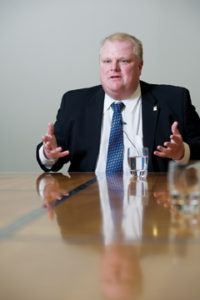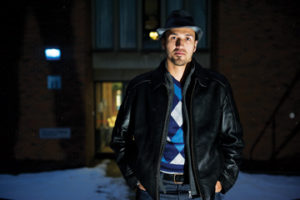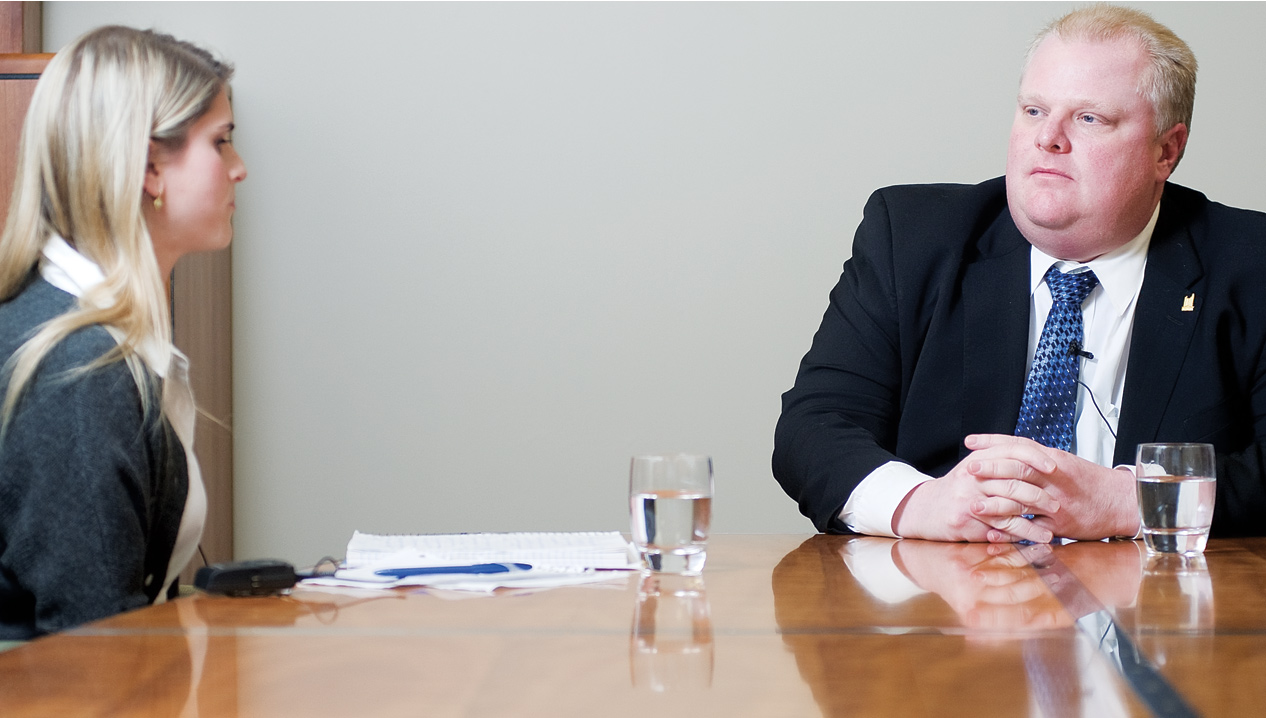Strolling into the office of Toronto mayor Rob Ford isn’t as intimidating as one might assume.
Located on the second floor of Toronto’s City Hall, it looks just like any other office in the building – just with the words “Mayor’s Office” inscribed on the doors.

The space, like Mayor Ford, is practical and down-to-earth. There doesn’t appear to be any room for padding or luxury, with Ford’s aides crammed into small corners and a boardroom that barely compares to the spacious meeting spaces of most Bay Street investment firms.
And, like Ford, the office is constantly in a frenzy.
While I sat there, endlessly waiting for Ford – our interview was delayed for two hours – Ford and his staff scrambled to catch all their meetings on time. That’s why, when the exhausted Ford finally sat down to talk to Excalibur, it was apparent certain priorities had taken precedence – a hierarchy is evident, too, in his initiatives for changing the city of Toronto.
From the onset, Ford’s priority was apparent: to manage the city hall “mismanaged” under Toronto’s former mayor, David Miller; ending what Ford calls “the gravy train”; and getting spending and waste under control.
These have inspired Ford to scrap Miller’s transit city plan for light rail transit in favour of a cost-effective transit plan, as well as more subway stops and lines, and bus routes.
Ford stressed that the people of Toronto were especially upset by the mismanagement of transit funds for the St. Clair light rail transit plan; budgeted for $40 million, it ended up costing upwards of $100 million with the added traffic congestion.

Ford’s new transit plan, however, has also motivated the Toronto Transit Commission to cut back the hours on a number of “low ridership” bus routes, which could mean a few routes will stop running after 10 pm
Some of those routes are used by students who attend university, and who stay at school later than 10 pm Mayor Ford assured me cost is foremost in his concerns.
“I’m not the expert [on the TTC] and there are costs affected by keeping all the routes and I think at the end of the day everything comes down to money,” said Ford.
When it came down to York’s new subway station, Ford said the project was very important and instrumental. While most people know the City of Toronto is committed to extending the Spadina subway line through York’s Keele campus to the Vaughan Corporate Centre, Ford noted he was not personally involved in the talks surrounding this project, and was unable to say whether the project was on course.
While Ford stressed that getting rid of wasteful spending at City Hall was his main priority, he described his recent budget outline as one that put more money into student’s pockets.
“I’m not much older than the students – we’re a younger generation, and I understand the challenges you have,” said Ford. He pointed out that lobbying from the student population instigated his scrapping the $60 vehicle registration fee, that many student drivers made it clear to him they simply couldn’t afford the fee.
“My job is to lower taxes, create jobs, have businesses come into the city for students – when you get out of university, you have a job waiting for you,” said Ford.
When the conversation turned to the topic of safety, an issue pushed to the forefront of Ford’s campaign (he’d promised 70 additional frontline officers to target gangs and violence in priority neighbourhoods and schools around Toronto) Ford simply said that, as of now, new officers will not be added.
“I don’t have the power to go out and say we’re going to hire 200 or 300 more police officers,” said Ford.
Ford’s initial plan to implement more officers around the city involved funding made up by cutting the number of city councillors from 44 to 22, another big part of his campaign platform.
Some students have suggested this cut will result in council’s inability to best represent the diverse communities of Toronto, but Ford justified the move by comparing his new numbers to those of the pro- vincial and federal governments.
He pointed out that both the Members of Parliament (MPs) and Members of Provincial Parliament (MPPs) number 22 representatives each, pointing out specifically that the Eglington and Lawrence regions have one MP and one MPP, but two city councillors. Ford pointed out that the reduction will essentially get rid of the weaker councillors.
“If our MPs and our MPPs can do it, why do we need all this duplication and waste at the municipal level?” asked Ford, adding the plan to decrease city councillors will not occur for another three years.
Evidently, while the hustle and bustle of the mayorship persists, and Ford goes forward tackling City Hall’s issues first and foremost, he will never lose his love of tackling in another area: football.
He said he believed York’s new football coach will turn the tide around, ending the conversation with a simple “Go York Go!”

STUDENT PERSPECTIVE
Rob Cerjanec, Founders College president, discusses Mayor Ford’s policies
ON TRANSIT
“I think it’s a bad idea [to scrap former mayor Miller’s Transit City plan] and the reason is that your building a significantly smaller number of kilometres of subways than you would be of light rail transit. Light rail is about three times cheaper. For one km of subway, you can build about three km of light rail.”
ON THE REDUCTION OF HOURS OF LOW RIDERSHIP BUS ROUTES
“It’s no secret the ridership for these lines is not very high, but the people they connect is substantial, like the students who rely on the Downsview Park line when they participate in events off-campus. They will now have to walk in the dark.”
ON BUDGET
“His budget outline doesn’t put more money into student’s pockets. Students don’t own homes or pay property taxes on those homes and the students that drive and own their own car is a very low number. If you look at the bus loop at school, it’s always jam-packed with students getting to and from school.”
ON REDUCTION OF CITY COUNCILLORS
“I think it’s a terrible initiative. I don’t think it’s a good idea because if you represent a provincial or federal riding, you represent twice as many people as a city councillor. But the city itself provides a lot more services to its residents than at the provincial or federal level – such as bylaws, gar- bage and the TTC, and cutting that amount of representation would be detrimental to citizens who rely on those councillors.”
STUDENT COMMENT
What do you think of the reduction in hours for low ridership TTC routes?
Zaheen Budhwani, Sociology, fourth year
“I think it’s unfair. If they’re gonna do that, they should lower [TTC] costs.”
What do you think of the vehicle registration fee?
Gurjot Brar, Human resources, fourth year
“It’s helpful, but only to someone who drives regularly. I also still use the TTC.”
What do you think of Rob Ford’s plan for Toronto?
Flavia Zhamo, General arts, first year
“I don’t like some of [Ford’s] policies. I think he’s old school.”
Nathaly Schneider, Communications, fourth year
“So far I’m impressed with him. He’s worked to cut spending in the City Hall, and any mayor who takes the time to make sure every phone call and concerns gets responded to is a step in the right direction for this city.”
North of Toronto, south of York: still in Ford country



You write that “These have inspired Ford to scrap Miller’s transit city plan for light rail transit in favour of a cost-effective transit plan, as well as more subway stops and lines, and bus routes.”
It’s not clear how extending a subway line already running with an operating loss of millions of dollars annually is more cost-effective than a cheaper option spanning the city.
Well I guess I don’t have to spend the weekend fiunirgg this one out!